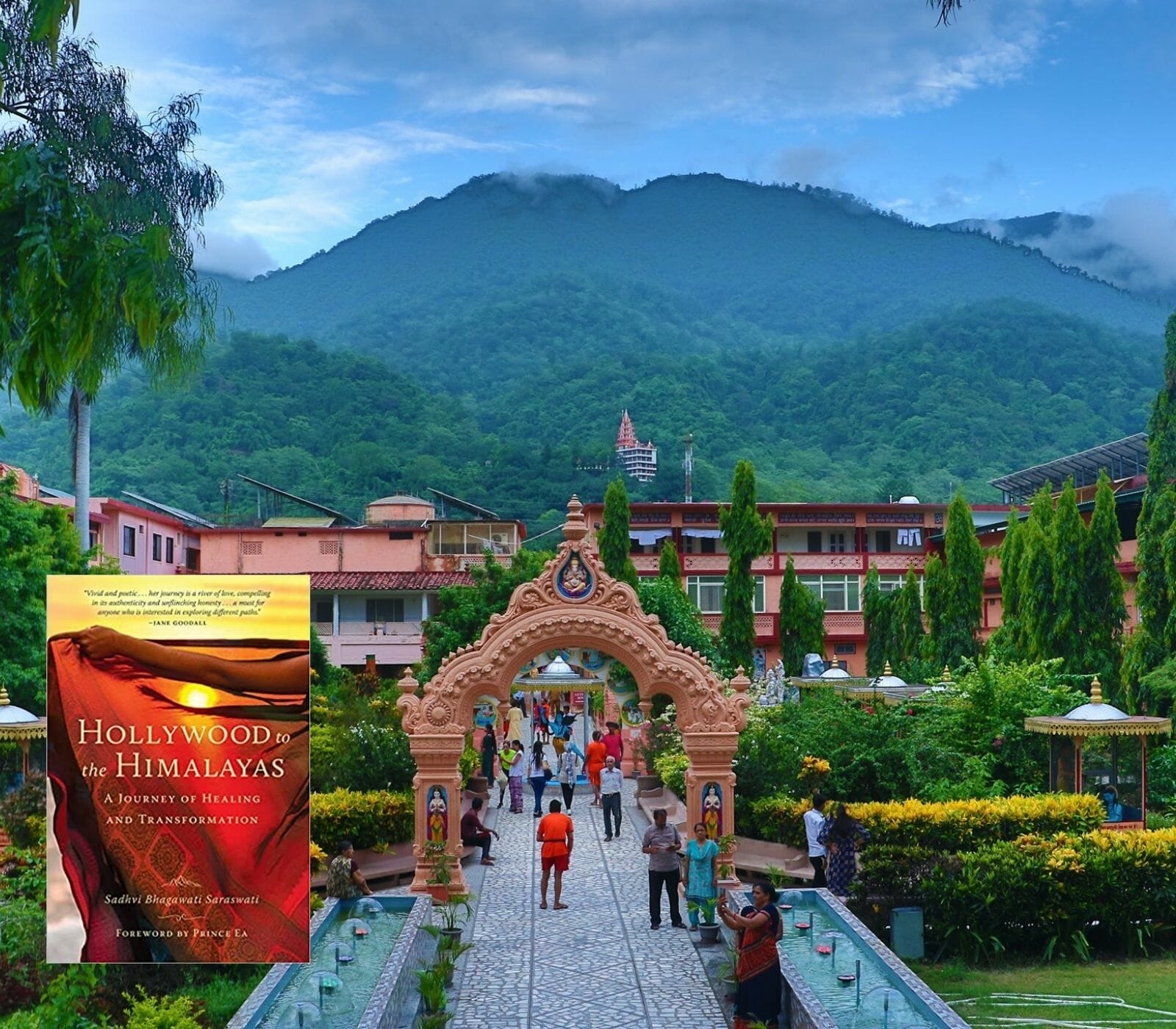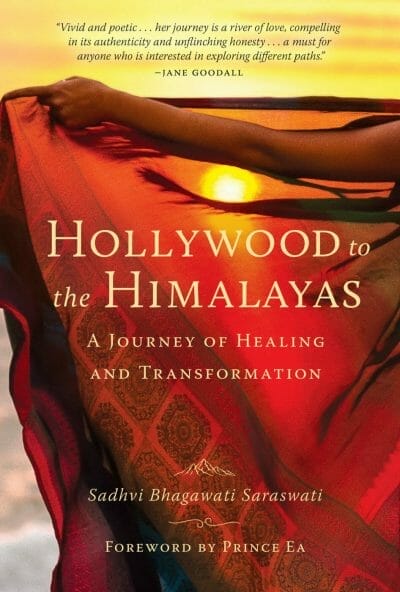Arriving at the Ashram – Hollywood to the Himalayas

One day, as I walked through the ashram, I heard a clear, stable voice, a man’s voice, saying, “You must stay here.” I looked around to see who had spoken, but the pathway was empty. I looked up, and there was no one on the balconies above. If the voice had come from the central gardens, it would have had to be a shout, not the gentle voice I’d just heard. No one had spoken.
An Excerpt from Hollywood to the Himalayas: A Journey of Healing and Transformation
Written by Sadhvi Bhagawati Saraswati
If no one was around, there couldn’t have been a voice, I reasoned. I must have imagined it. So I kept walking. Thirty seconds later, I heard it again—a soft, calm male voice, as though spoken by a gentleman in the seat next to me on a plane or a train. “You must stay here.” Again, I looked, and the pathway and balcony were still empty.
Meditative though I had become, I was sure I hadn’t lost my common sense. Clearly, if there was a voice, there had to be a speaker. If there was no speaker, there was no voice. The only people who heard voices were schizophrenics and Joan of Arc. My experiences since I had first laid eyes on Ganga had been expansive and whole, not the fragmentation of schizophrenia. I was not delusional. Yet, if I wasn’t delusional and I wasn’t Joan of Arc, who had spoken? No one was there, so no one had spoken. I could not have heard a voice.
Then I heard another voice, recognizably my own. It said, speaking in the authoritative, commanding second person to which I was accustomed, You are about to ignore a very strong sign. You are about to pretend that you didn’t hear a voice, just because it doesn’t make sense. You’re free to do that. But it is a violation of your vow to keep your heart open. You promised you would keep your heart open to any signs of why you came to India. You promised that if you couldn’t keep your heart open, you would leave. The internal reproach continued: So, if you are going to pretend that you didn’t hear a voice, you must go back to Delhi and get on a flight home to San Francisco. You cannot break your own vow.
I was not in the mood to navigate a return trip to Delhi or to leave India yet. Along with the ecstasy, I was fighting a cold. I had, therefore, one choice. Conceding to my own ultimatum, I walked off the central pathway and onto a smaller pathway in the Parmarth Niketan ashram toward a large sign with OFFICE painted on it in English.
“I would like to stay here,” I told the man behind the counter. He and three other gentlemen sat cross-legged on a thin mattress behind a low wooden desk. He did not respond; he just looked at me.
“Excuse me. I would like to please stay here,” I repeated, slower and louder, careful to enunciate my words. He continued to stare at me. Was I actually speaking? Were my lips making sound, or was I imagining this as well?
“Is it possible? Can I stay here? How much does it cost?” He continued just to stare at me—not the kind of lascivious stare that makes you feel naked; he just stared as though it were too much trouble to move his eyes away. He clearly had no intention of responding.
I turned to the other two men. They immediately busied themselves shuffling papers from one side of the desk to the other. “Excuse me, please.” I tried again. “Can I please stay here?” One of the paper-shuffling men rose and returned a moment later with a fourth man, who spoke to me in English. “You want to stay here?” he asked. “Yes, please,” I gasped, grateful for someone who spoke at all and doubly grateful it was English.
“There is nothing for you here,” he responded matter-of-factly. “All of our programs are in Hindi. Even the yoga classes are in Hindi. There is nothing in English. Also, you must get up early in the morning for the five o’clock prayer ceremony, and that is also in Hindi. You should go to the ashram down the road. They have classes in English.”
“Oh, thank you so much.” I walked quickly out of the ashram, excited to tell Jim that I had found a place with classes in English, and equally pleased to ignore the implication of the mysterious voice I had heard.
When we arrived at the ashram further downriver, I immediately felt repelled. This was not where I was supposed to be. They did have a full day’s activities in English—yoga, meditation, philosophy—but I needed to get back to Parmarth Niketan. The voice had become a rope pulling me back.
I hurried back to Parmarth Niketan and pleaded with the man in the office who spoke English, “I will get up at any time that you say. I will sit through whatever you say I need to sit through, whether I understand it or not. It doesn’t matter. I just want to stay here. Please.”
“Actually,” he replied, “we do not have the authority. You are a girl, and you are a foreigner. You can only stay here with permission from our president.”
“OK, great. No problem. Please let me meet the president so I can ask him.”
“Actually, he is out of town.”
“Oh,” I replied, my heart sinking a bit. “When will he return?”
“Maybe tomorrow,” the tall man replied.
“Great. I will come back tomorrow.”
I had not read the section in the India guidebook that explains that people in India, and especially in the service class, will tell you whatever they think you want to hear. Truth is less important than goodwill, and the highest goal is to keep you happy: “Is my faucet fixed?” “Oh, yes, Ma’am, faucet is fixed.” You’re happy to hear this news, so his goal is accomplished . . .
© 2021 Hollywood to the Himalayas by Sadhvi Bhagawati Saraswati. Excerpted with permission of Mandala Earth and Insight Editions, L.P.
To learn more, or to purchase Hollywood to the Himalayas, click the book cover or visit Amazon.com
All proceeds from the book will be donated to the Divine Shakti Foundation, a charitable organization dedicated to women, girls, and education.
Learn more about getting your book, product, or event featured in an OMTimes Spotlight!
About Sadhviji
SADHVI BHAGAWATI SARASWATI serves as on the United Nations Advisory Council on Religion and on the steering committees of the International Partnership for Religion and Sustainable Development (PaRD) and the Moral Imperative to End Extreme Poverty, a campaign by the United Nations and World Bank. She is also the Secretary-General of the Global Interfaith WASH Alliance, an international interfaith organization dedicated to clean water, sanitation, and hygiene; president of Divine Shakti Foundation, a foundation that runs free schools, vocational training programs, and empowerment programs; and director of the world-famous International Yoga Festival at Parmarth Niketan Ashram, Rishikesh—which has been covered in Time, CNN, the New York Times and other prestigious publications and has been noted by both the Prime Minister and Vice President of India. Sadhvi has lived for the past 25 years at the Parmarth Niketan ashram in Rishikesh, India, where she oversees a variety of humanitarian projects, teaches meditation, lectures, writes, counsels individuals and families, and serves as a unique female voice of spiritual leadership throughout India and the world.
OMTimes is the first and only Spiritually Conscious Magazine. Follow Us On Facebook, Twitter, Instagram, Linkedin, Pinterest, and Youtube
OMTimes Magazine is one of the leading on-line content providers of positivity, wellness and personal empowerment. OMTimes Magazine - Co-Creating a More Conscious Reality








